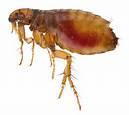It's Flea and Tick Season: Is Your Pet Protected?
- posted: May 31, 2019

Even though the weather can’t seem to make up its mind, it is officially spring in Pennsylvania. That means it’s time to think about protecting your pets against those nasty external parasites: fleas and ticks. While pets can have parasite problems year-round, (judging by the number of ticks on pets this winter), spring and summer usually herald in warm, humid weather—prime conditions for these pesky insects and arachnids to be out in full force.
Ticks are arachnids, members of the spider family. If you live near or walk your dog in wooded areas, ticks may live in the grass along the tree line and can climb onto your pet when she walks past. Contrary to popular belief, ticks don’t actually live in or fall from trees, but remain in the grass. Ticks can be found in suburban yards as well, so don’t be complacent with protection even if you don’t live near the woods. They also do not die over the winter, but hibernate and become active in temperatures as low as 35-40F.
Besides attaching to your pet’s skin and feeding off his or her blood, ticks also carry diseases such as Lyme disease and ehrlichiosis. York County currently has the same number of Lyme cases in dogs so far in 2019 (198 cases) as New London County, Connecticut where the city of Lyme is located which is where the disease was first discovered and how it got its name. Using a good quality flea and tick preventative year-round and vaccinating high-risk dogs against Lyme disease will drastically reduce the chance of dogs contracting Lyme and other tick-borne illnesses.
Fleas are also more active in warmer weather and can cause significant allergic skin reactions and can also spread parasites like tapeworms to pets and more serious diseases like feline mycoplasmosis which causes anemia in cats. Fleas are difficult to get rid of once they have already invaded your pet and your home, so be sure to use flea preventatives on a regular basis to prevent infestations rather than waiting until you see a flea on your pet to use them.
Adult fleas spend their lives on a cat or dog’s body. Females lay up to 50 eggs per day which fall off the pet contaminating the environment as they hatch into maggots, pupate much like a butterfly or moth, then hatch into adult fleas in about two weeks. If you do the math, that’s potentially 700 new fleas every 2 weeks! Other mammals can also get fleas, so check guinea pigs, ferrets and rabbits and talk to your veterinarian about treatments and preventatives as many are “off-label” and some compounds can be harmful for pocket pets.
In general, flea powders, sprays and shampoos/dips are a thing of the past and are not very effective. Flea collars are also less effective than products applied directly to the skin, though there are a few on the market that do seem to work. Patton Veterinary Hospital carries a number of safe and effective flea/tick products. There are some chewable options for dogs as well as a number of topical products for both dogs and cats. We also carry an area spray for treating fleas in the home. One work of caution, some products that control fleas and ticks in dogs, particularly those containing permethrin are extremely toxic to cats. ALWAYS carefully read labels and NEVER, EVER apply products labeled for dogs to your cat. Ask our vets about which products are best for protecting your pet against fleas and ticks this spring and all year long.
This blog brought to you by the Patton Veterinary Hospital serving Red Lion, York and the surrounding communities.
Location
Patton Veterinary Hospital
425 E Broadway
Red Lion, PA 17356
